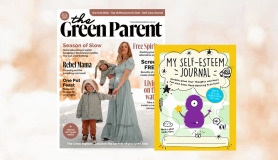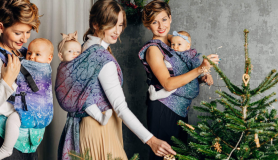Karen Kingston, author of Clear Your Clutter with Feng Shui (a very useful book that comes in a small format so it doesn’t clutter up your bedside table too much!), suggests that clearing your clutter helps free up sacred space in your life. Karen has written and taught extensively on creating sacred space, and the only way to do this is to free yourself from the emotionally, psychically, physically and spiritually clogging things we carry from one house to the next, promising ourselves we’ll ‘use them one day’.
So why do we hang on to things and how can we change?
It has sentimental value
Most of us are guilty of keeping things with sentimental value. Of course, this isn’t always a bad thing. Karen Kingston writes about how we invest an object with our energy which is what makes it so precious – a well-loved teddy bear, for example, can carry years of energy imprinting. But keeping old objects can actually stagnate our own energy, prevent our moving forward in our lives and keep us stuck in the past. The thing here is to be selective about what you want to keep. If you have a selection of objects to remind you of a special person, select one that really resonates. Keep that item on display – do not put it in a box in the loft. Or perhaps you might find that a framed photo of the person works the same magic, and that that is a better use of your space and energy than objects that no longer serve us.
It was a gift
Someone gave you an ornament you really dislike and now you feel honour-bound to keep it – don’t! Someone, somewhere, is going to delight in your unwanted gift, whereas for you it is just a piece of clutter. If you gave a gift that someone really disliked – be it a book, ornament, or item of clothing – you wouldn’t want them to hang on to it for years and years because they felt they had to. Honour the sentiment and the love that was expressed with the gift, and then donate it to charity for someone else to enjoy. Keep in mind that there are many ways to express our love for others, and rather than give gifts you’re not sure someone will like, why not take your friend or family member out for the day and give them a memory to treasure.
It might come in handy one day!
One of the things I came across recently in one of our household drawers was an impossibly huge bundle of rubber bands. Every day, our mail arrives with one of these red rubber bands around it, and we had been stuffing them in said drawer. I decided to take them all to the post office immediately! The previous generation, who grew up in the privations of post-war Britain, were prone to hang on to every little item in case it ‘came in handy one day’. It’s a hard habit to break, but again, a lot of these items can be used by someone else today: there’s sure to be a delighted recipient of your saved Jiffy bags on Ebay! Be mindful when you find yourself ferreting something away – record what it is and where you put it so you don’t go out and buy another one in a month’s time. And if you haven’t used it within six months, let it go.
I am going to wear it when I lose weight
When I polled my friends, most of them admitted that they have a pair of jeans they keep in the wardrobe as a ‘diet incentive’. Not only is this a heart-breaking indictment of our pressure to look a certain way, it also leaves us constantly in a mindset that we’re not good enough as we are. Celebrate your curves, let go of your unrealistic body expectations, and make a commitment to love yourself JUST AS YOU ARE. Donating that too-small item of clothing to charity is an act of self-love – go do it now!
It just needs to be mended
I am seriously guilty of this one and even have spools of thread that match the colour of clothes in need of repairing, all stuffed in bags at the back of the wardrobe. It is, of course, better to mend things than buy new, so if you have a backlog of things needing your attention, leave them out in a prominent place until you’ve dealt with them. I find dedicating a few hours to tackling those ‘need to be mended’ items is really cathartic. But be realistic – if you haven’t mended the item in the last six months (and you haven’t been using or wearing it during this time), move it on. There are many banks for clothes recycling, or you could Freecycle items or parts of items.
I need an extra one in case
With all the BOGOF offers in shops these days, it’s easy to accumulate a vast collection of the same thing. If your bathroom is beginning to look like a hairdressers, then donate some of your extras to friends and family. However, buying in bulk, particularly when it comes to food items, is often cheaper. If you do buy things in bulk, stay as organised as you can and aim for neat, accessible storage. Keep your records up to date, everything clearly labelled, and a system of the oldest at the front, newest at the back.
It makes me feel secure
A Yale University study showed that people who derived a sense of security from possessions were found to be significantly less secure in interpersonal relationships. “We conducted two studies, and the basic finding in both is that if you make people feel interpersonally secure, they’ll place a lower monetary value on possessions,” said study author Margaret Clark, a professor of psychology at Yale. Perhaps if you find yourself surrounded by objects that make you feel secure, it is time to address your relationships and pour some love and healing into your own heart and life. It might just help you let go of the need to acquire more stuff, and give your credit card a well-earned rest!
I want to pass it on to my kids
Your thimble collection is amazing, right? Naturally your kids are going to want to inherit it. Well, maybe not. Friends of ours without kids told us recently that they’d already begun, in their fifties, the process of getting rid of their stuff: ‘When we go, there won’t be anyone to trawl through the attic, so it makes sense to shift stuff now and hopefully find it a good home before its dog-eared, dusty or passé.’ It made me think. How many of us hold on to generations of stuff because we feel guilty. But finding it new homes is actually beneficial to you and the recipient: my mum recently donated some Edwardian feathers and flowers, once belonging to a neighbour of her great aunt’s (I kid you not!), to a milliner who was happy to be able to put them to use. Your collections also force an expectation onto your children: perhaps they have no interest whatsoever in military history but feel they should because they have your vast collection of books on the subject. Let kids discover their own passions in life.
It might be valuable one day
There is truth in this, of course. Some things do gain in value as they age, as programs like Cash in the Attic show. But so many of the people featured on the program seem disappointed with the returns of their great grandfather’s pocket watch they’ve been hanging on to for so long, that it seems foolish to clutter your life up with extraneous objects in the hopes of them becoming your cash cow one day. A friend of mine who had been holding on to some crystal champagne glasses for years recently went to get them out from the loft to take to auction. Stepping down off the ladder, she lost her footing and the boxed-up glasses smashed to the ground. All of them were broken. Luckily, my friend was able to see the funny side and took it as an important lesson that stuff, however much monetary value we might ascribe to it, is just that: stuff. Let it go, and free your life up for more important things.
The Joy of Less: A Minimalist Living Guide How to Declutter, Orgnaise and Simplify Your Life by Francine Jay
The Power of Less The Six Essential Productivity Principles that will change your life by Leo Babauta
Clear Your Clutter with Feng Shui by Karen Kingston
Banish Clutter Forever by Sheila Chandra







